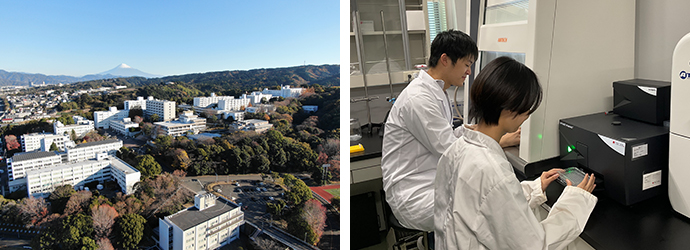 Japan
Japan

 Japan
Japan
GLOBAL NEWS
11 September 2023
Suzuki Starts Joint Research with Shizuoka University
on Microplastic Identification Technology
- Utilizing the Adhering and Coloring Properties of Proteins to Plastics,
to Promote the Clean Ocean Project -

(From left, Shizuoka University Campus, lab where research will be conducted.
Both provided by Shizuoka University)
Suzuki Motor Corporation (hereinafter “Suzuki”) and National University Corporation Shizuoka University (hereinafter “Shizuoka University”) has signed a joint research agreement regarding microplastic identification technology utilizing the adhering and coloring properties of proteins to plastic.
As part of the Suzuki Clean Ocean Project, Suzuki developed a microplastic collecting device (MPC) that can be equipped on outboard motors, and began sales in July 2022 as standard equipment on select models. We are analyzing the substances collected with the MPC, and the development to improve our product capabilities is ongoing. In addition to microplastics, substances collected with the MPC include sand, wood scraps, and microscopic marine organisms, and manual and visual sorting requires experience and skill. The collected materials are not analyzed at monitoring points in Japan and overseas, but are analyzed at the head office, making efficiency improvement an issue.
Shizuoka University has strengths in research utilizing enzymes and proteins possessed by microorganisms, and they have knowledge in those fields regarding the adhering properties of proteins. An interest in this research and knowledge by a member of Suzuki's Marine Technical Center led to this joint research.
The protein used in this study has the property of adhering to plastics and coloring it. The color differs depending on the combination of protein and plastic. Taking advantage of this property, by adhering and coloring the plastics that have been collected with the MPC with proteins, it enables accurate and quick identification of plastics and its type. In addition, image recognition will make it easier to obtain data from monitoring points in Japan and overseas, leading to timely development.
Customers using MPC-equipped outboard motors have requested that they want to keep track of the amount of microplastics they have collected easily. In the future, we hope we will be able to visualize the amount and type of plastic collected through image recognition by putting this identification technology into practical use, which will bring our efforts to reduce marine plastic waste closer to home.
■Comment from Shuichi Mishima, Executive General Manager of Marine Operations
Through this joint research with Shizuoka University, we wish to acquire microplastic identification technology to support customers' interest and efforts to protect the marine environment, and to contribute to the improvement of the marine environment.

